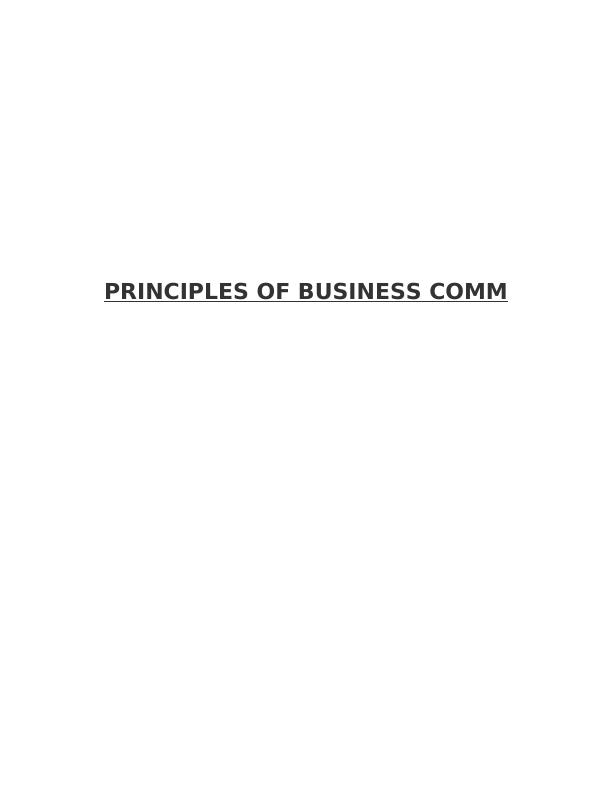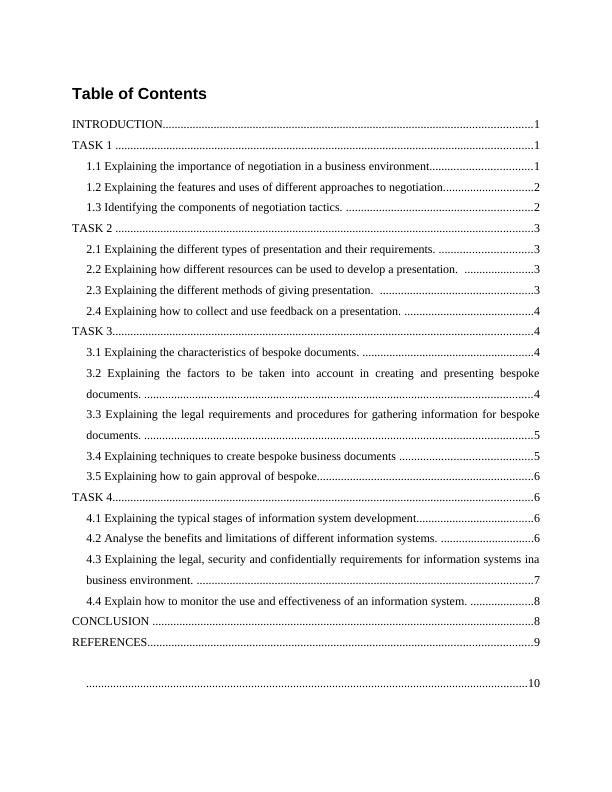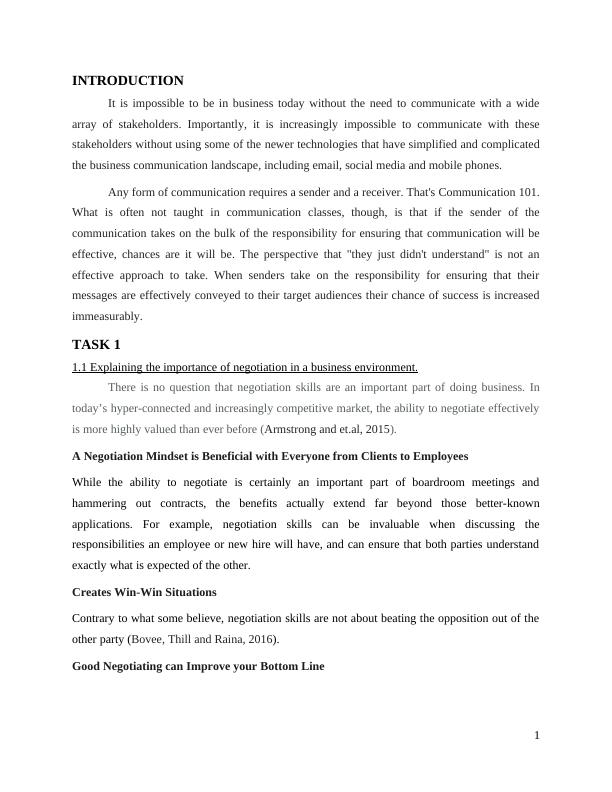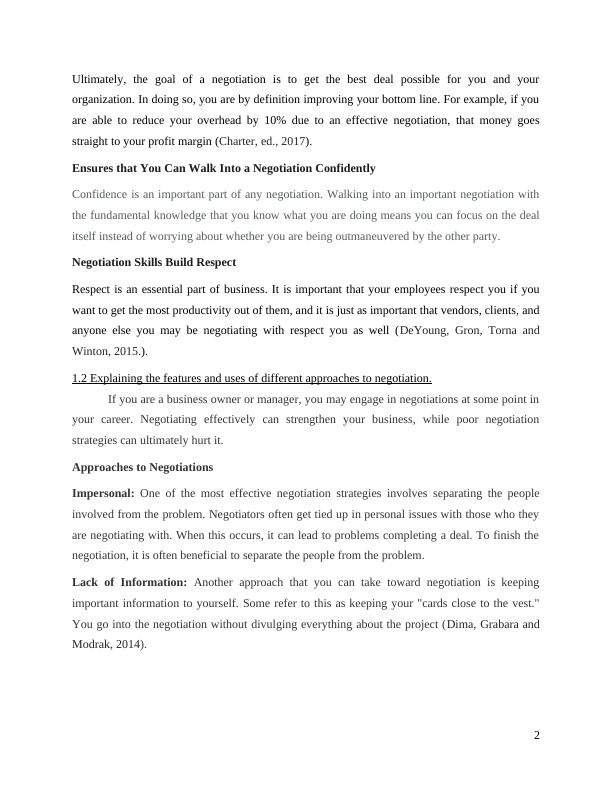Principles of Business Communications
Added on 2020-06-04
12 Pages3277 Words54 Views
PRINCIPLES OF BUSINESS COMM

Table of ContentsINTRODUCTION...........................................................................................................................1TASK 1 ...........................................................................................................................................11.1 Explaining the importance of negotiation in a business environment..................................11.2 Explaining the features and uses of different approaches to negotiation..............................21.3 Identifying the components of negotiation tactics. ..............................................................2TASK 2 ...........................................................................................................................................32.1 Explaining the different types of presentation and their requirements. ...............................32.2 Explaining how different resources can be used to develop a presentation. .......................32.3 Explaining the different methods of giving presentation. ...................................................32.4 Explaining how to collect and use feedback on a presentation. ...........................................4TASK 3............................................................................................................................................43.1 Explaining the characteristics of bespoke documents. .........................................................43.2 Explaining the factors to be taken into account in creating and presenting bespokedocuments. .................................................................................................................................43.3 Explaining the legal requirements and procedures for gathering information for bespokedocuments. .................................................................................................................................53.4 Explaining techniques to create bespoke business documents ............................................53.5 Explaining how to gain approval of bespoke........................................................................6TASK 4............................................................................................................................................64.1 Explaining the typical stages of information system development.......................................64.2 Analyse the benefits and limitations of different information systems. ...............................64.3 Explaining the legal, security and confidentially requirements for information systems inabusiness environment. ................................................................................................................74.4 Explain how to monitor the use and effectiveness of an information system. .....................8CONCLUSION ...............................................................................................................................8REFERENCES................................................................................................................................9...................................................................................................................................................10

INTRODUCTIONIt is impossible to be in business today without the need to communicate with a widearray of stakeholders. Importantly, it is increasingly impossible to communicate with thesestakeholders without using some of the newer technologies that have simplified and complicatedthe business communication landscape, including email, social media and mobile phones.Any form of communication requires a sender and a receiver. That's Communication 101.What is often not taught in communication classes, though, is that if the sender of thecommunication takes on the bulk of the responsibility for ensuring that communication will beeffective, chances are it will be. The perspective that "they just didn't understand" is not aneffective approach to take. When senders take on the responsibility for ensuring that theirmessages are effectively conveyed to their target audiences their chance of success is increasedimmeasurably.TASK 1 1.1 Explaining the importance of negotiation in a business environment.There is no question that negotiation skills are an important part of doing business. Intoday’s hyper-connected and increasingly competitive market, the ability to negotiate effectivelyis more highly valued than ever before (Armstrong and et.al, 2015).A Negotiation Mindset is Beneficial with Everyone from Clients to EmployeesWhile the ability to negotiate is certainly an important part of boardroom meetings andhammering out contracts, the benefits actually extend far beyond those better-knownapplications. For example, negotiation skills can be invaluable when discussing theresponsibilities an employee or new hire will have, and can ensure that both parties understandexactly what is expected of the other.Creates Win-Win SituationsContrary to what some believe, negotiation skills are not about beating the opposition out of theother party (Bovee, Thill and Raina, 2016). Good Negotiating can Improve your Bottom Line1

Ultimately, the goal of a negotiation is to get the best deal possible for you and yourorganization. In doing so, you are by definition improving your bottom line. For example, if youare able to reduce your overhead by 10% due to an effective negotiation, that money goesstraight to your profit margin (Charter, ed., 2017).Ensures that You Can Walk Into a Negotiation ConfidentlyConfidence is an important part of any negotiation. Walking into an important negotiation withthe fundamental knowledge that you know what you are doing means you can focus on the dealitself instead of worrying about whether you are being outmaneuvered by the other party.Negotiation Skills Build RespectRespect is an essential part of business. It is important that your employees respect you if youwant to get the most productivity out of them, and it is just as important that vendors, clients, andanyone else you may be negotiating with respect you as well (DeYoung, Gron, Torna andWinton, 2015.).1.2 Explaining the features and uses of different approaches to negotiation.If you are a business owner or manager, you may engage in negotiations at some point inyour career. Negotiating effectively can strengthen your business, while poor negotiationstrategies can ultimately hurt it.Approaches to NegotiationsImpersonal: One of the most effective negotiation strategies involves separating the peopleinvolved from the problem. Negotiators often get tied up in personal issues with those who theyare negotiating with. When this occurs, it can lead to problems completing a deal. To finish thenegotiation, it is often beneficial to separate the people from the problem.Lack of Information: Another approach that you can take toward negotiation is keepingimportant information to yourself. Some refer to this as keeping your "cards close to the vest."You go into the negotiation without divulging everything about the project (Dima, Grabara andModrak, 2014).2

End of preview
Want to access all the pages? Upload your documents or become a member.
Related Documents
Principles of Business Communication : Assignmentlg...
|10
|3008
|65
Business Communication Contentslg...
|9
|2696
|452
Principles of Business Communicationlg...
|13
|3315
|74
Principles of Business Communication : Reportlg...
|10
|2748
|47
Business Administration Assignment Solved (Doc)lg...
|10
|2551
|455
Principles of Business Communication - Assignmentlg...
|11
|3246
|35
